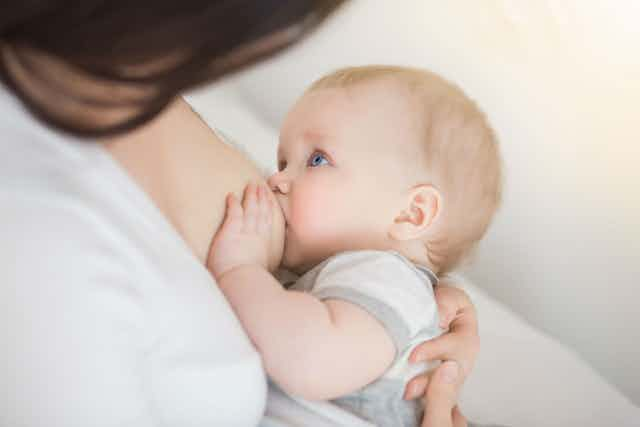Though some mums choose not to breastfeed their children, it is still considered by most to be “an unequalled way of providing ideal food for the healthy growth and development of infants”.
It is for that very reason that both the World Health Organizationand the NHS specifically recommend breast milk as the only food for babies up to six months old, with infants benefiting from continued breast milk up until at least two years old.
But for both new and experienced mothers, starting to breastfeed a new baby can be difficult. For both parent and child to remain happy and healthy, they need support. In the UK, more than 80% of mothers breastfeed their baby at least once, but rates drop off quickly.
According to NICE – the body which suggests the treatments patients should receive as part of NHS England care – the health service should have “a multifaceted approach or a coordinated programme of interventions across different settings to increase breastfeeding rates”. In other words, all mothers should be getting help to breastfeed their babies – but we’ve found that this is not the case.
One specific NICE recommendation is that mothers should be guided and encouraged through breastfeeding peer support programmes. The peer supporters are women who have received training in breastfeeding and have personal experience. However, NICE does not provide guidance about what this peer support should be like. In the US, there is a standardised training programme for peer supporters, trainers and service managers, which has helped to work towards a standard service across the country. But in the UK, each NHS trust or health board has its own strategy for the care of breastfeeding mothers, and these training programmes vary greatly.
Service success
To date, breastfeeding peer support services have not been successful in the UK. For this reason, the National Institute for Health Research commissioned us to undertake a programme of research to find out how mothers were being supported to breastfeed across the country, outside of midwifery and health visiting services.
We asked NHS and local authority staff who had responsibility for infant feeding if breastfeeding peer supporters were available in their area – defined as either a NHS health board, NHS trust or local authority (in England). Where we did not get a reply from the member of staff, we searched NHS/local authority websites.

What we found was that breastfeeding peer support is not available uniformly across the country – despite NICE’s recommendation. In fact, peer support is only available in 56% of NHS trust areas. This postcode lottery means that some mothers are not able to access peer supporters, which might make it harder for them to breastfeed their children.
Alongside this, participants also told us that services were not even available uniformly under the NHS trusts and health boards they worked with or for – while some towns had access to peer support services, others did not. They attributed this lack of service to the money available, rather than the support needs of new mothers. Indeed, some services reported there had been budget cuts which meant services such as training new peer supporters could not be provided.
Among the areas which had peer supporters, the roles that they did – such as providing support in hospital wards or visiting new mums at home – varied. Participants in our study advised that peer support services were most complimentary to NHS midwifery care when the peer supporters had clear roles and responsibilities. It was also important that peer supporters were visible to midwives and health visitors, for example by working on postnatal wards.
The health professionals also told us that it was difficult to attract mothers from poorer backgrounds to seek support from breastfeeding peer support programmes.
We also looked into the availability of support groups for breastfeeding mothers across the country. These are groups based in the community which aim to help mothers breastfeed. Though they are sometimes run or attended by peer supporters, they are also run by midwives, health visitors and voluntary groups, such as the National Childbirth Trust. Most areas in the study (89%) had at least one breastfeeding support group, but the number of groups was not related to the number of births or the perceived level of need.
Proving benefit
One reason for the low prevalence and lack of funding for breastfeeding support may be the insufficient amount of evidence of its clinical benefit in the UK. Globally, it has been proven that these support services increase breastfeeding rates, but without specific evidence from UK mothers, trusts would be reluctant to fund it.
For so many mothers, peer support feels absolutely vital to continuing their breastfeeding. At what can be a lonely, frustrating and upsetting time, it is absolutely vital that mothers have someone to turn to.
Our team is now working to test a new model of breastfeeding peer support, Mam-Kind, which aims to provide mothers with regular support to help them identify and meet their own breastfeeding goals.

